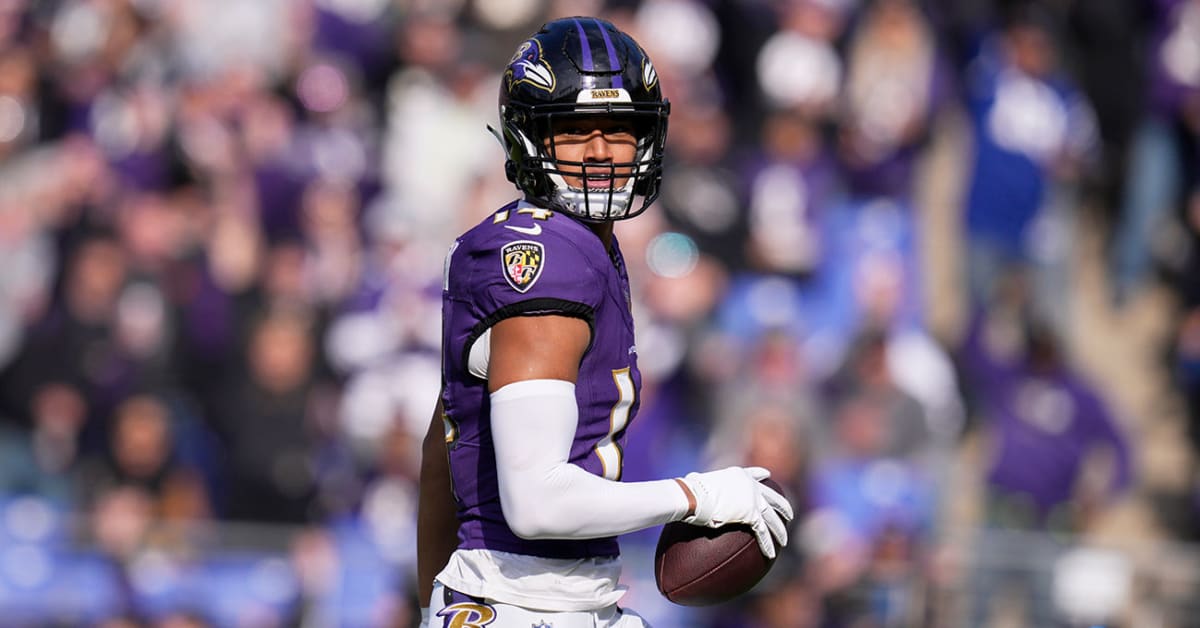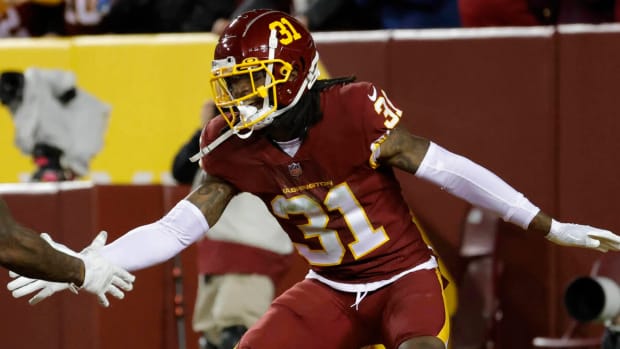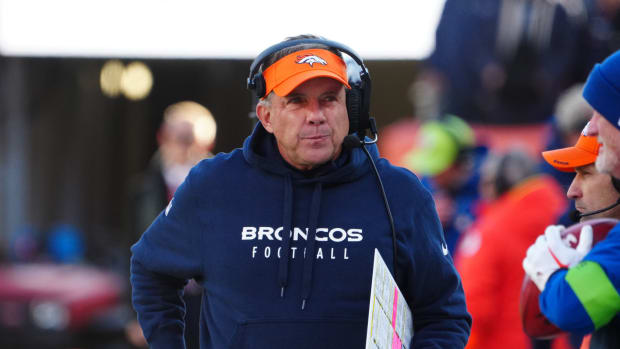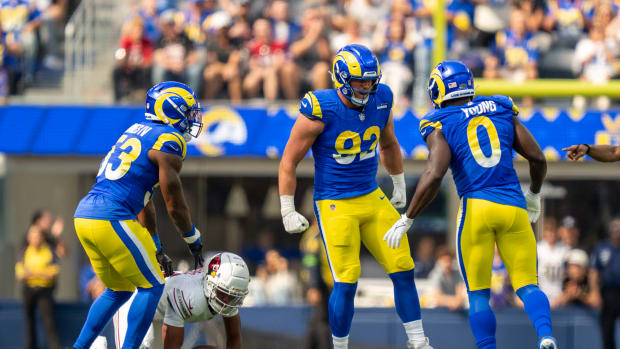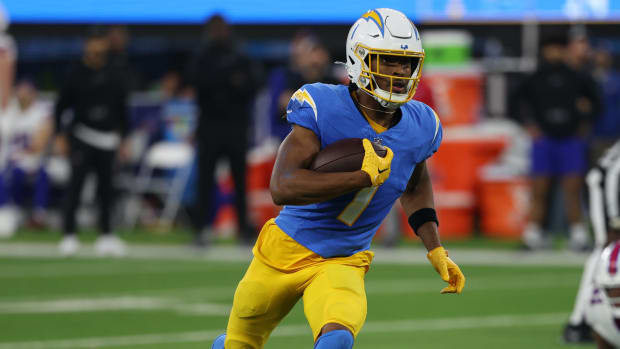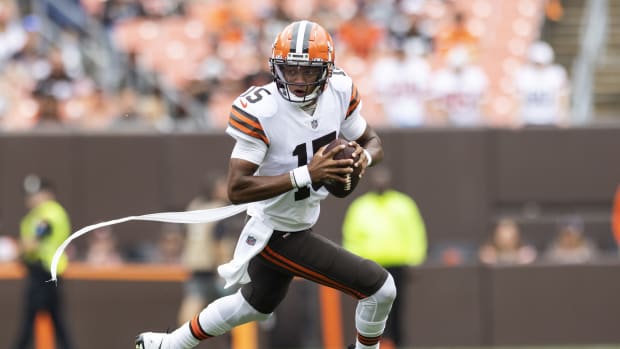Ravens Star Kyle Hamilton Was Raised to Do Everything
When Kyle Hamilton qualified for Mensa—basically: first-team All-Pro for the most intelligent among us—he didn’t know that Mensa existed. Which makes sense, even though he scored above 132 on a standard IQ test, leaping the barometer for membership. He didn’t know because he was in third grade. His mother filled out the application for him, received the acceptance packet and tried to explain the whole thing. Her son just shrugged, naturally, which owed to his age but also to his bearing.
Fast-forward about 15 years. Kyle Hamilton is still a genius. But unlike many of his fellow Mensa members, he’s not yet a business executive, doctor, venture capitalist nor scientist. His current day job consists of playing safety for the Baltimore Ravens, although simply naming his position falls woefully short of capturing his varied influence. He’s also still racking up accolades. Voted the Ravens “Good Guy” by local journalists. Named the youngest defensive starter for the Pro Bowl (at 22). Named first-team All-Pro—this time, in football—specifically, on the NFL Players Association’s list, where the best players are selected only by their peers.
That Hamilton reacted the same way he did to the IQ score in third grade didn’t surprise anyone who knows him. The day he made first-team All-Pro morphed a dream into an honor. But that’s not where Hamilton hunts for value, nor where the Ravens benefit from the impact he imparts. Both start with the same attribute—versatility. And Hamilton, Mensa member, All-Pro, might be the most versatile player in a league where that specific trait has never been more valued.

Hamilton is listed as a safety, but he is really much more than that.
Jessica Rapfogel/USA TODAY Sports
In some ways, Hamilton can seem engineered for the trait he best embodies. The easy, lazy comparison is to a Swiss Army knife. May any collection of random tools be so lucky. Hamilton is more versatile than that.
Sometimes, he is a safety; others, he’s not a safety at all. Consider him a queen on the world’s most violent chessboard. He covers large swaths deep downfield. He double-teams top targets. He blitzes quarterbacks and stuffs running backs and often slides to slot corner, where, at various points this season, he held the best coverage percentage in the league.
The Ravens wouldn’t have finished 13–4, won the AFC North and secured the conference’s No. 1 playoff seed without his emergence as one of the league’s best defensive players, regardless of position, especially since he plays so many. When he’s in the lineup, Baltimore ranks among the NFL’s fiercest defenses; when he sits, as he did twice for injuries this season, the same D, minus one player, ranks near the bottom of the league.
Maybe that’s because Hamilton is like more than one player for the Ravens. He’s a shutdown cornerback, an elite pass rusher who happens to not play defensive end, tackles like a middle linebacker and positions teammates like a quarterback. Browns coach Kevin Stefanski was onto something when, earlier this season, he likened Hamilton to a skeleton key when speaking with reporters. That’s something else Hamilton does—unlock, whether with defensive schemes, Ravens advantages or his own, seemingly limitless capacity.
In terms of actual positions, Hamilton plays as many as five—he has to count them over the phone—in any one game. He does this within the Ravens’ scheme, which can appear chaotic but is as organized, planned and detailed as chaos can be. What he does within those confines can still awe, as Hamilton adds art to the science in his playbook.
Hamilton can also … golf (scoring around 80, with minimal practice) … play the trombone … drain three-pointers on basketball courts … boast that he could score on Victor Wembanyama … crush home runs … write, sing, solve, adapt, plan, improvise … destroy video game opponents … and still find time to binge Netflix. Hamilton, in other words, can do anything.
In fact, he believes that doing many things makes him better at all the things. “They complement each other,” he says. “They give me a better grasp of the whole defense, allowing me to see where everybody’s gonna be and how I can fit off that.”
One play from this season explains Hamilton in this regard better than anything he could say. It unfolded against those Browns, in Week 10. Hamilton was blitzing but arrived late. He thinks the timing helped, because the quarterback didn’t see him, and when a pass attempt sailed downfield, he leapt, batted the ball, grabbed his own tip and sprinted into the other end zone. One pass defensed. One interception. One touchdown.
All in one play.
His mother, Jackie Hamilton, watches all the things unspool, and she can see what seems obvious: that a childhood of varied interests, influences, activities and skills prepared him to become the perfect skeleton key for a certain defense, in a league that’s trending in the same positionless direction as the NBA. Jackie laughs. It’s funny, because it’s true. “Trust me,” she says, “that was not the plan.”
It was, instead, the byproduct of a parenting strategy that focused on activity rates. Kyle devoured the children’s book series, Diary of a Wimpy Kid. One featured a blank page to scribble down life goals. He wrote “play in the NFL” and “play in the NBA.” O.K.! But how?
Some attributes were more intrinsic. Like his memory. Kyle first asked his mother whether he could play organized football at age 3. She told him not to ask again until his sixth birthday, and on that very day, without having ever mentioned his gridiron desires in the interim, without any prodding from his parents, he asked again. Genetics helped, too, as his father, Derrek, was drafted by the New Jersey Nets and played for various teams in several countries; while his older brother, Tyler, played multiple sports, starred in all and landed a college hoops scholarship.
Intrinsic attributes weren’t enough for all the places—and positions—young Kyle sped toward. Jackie gave her boys extra homework in the form of workbooks—writing, science, math and many others. She took them to museums, then paced them through art projects that mimicked what inspired them inside. When they wanted to visit the zoo, she ferried them there, as well, but only in exchange for learning about the animals. And every morning, whether school was in session or not, she gave her children one word from the dictionary, which they had to learn, spell and apply.
Kyle won prizes for his high school artwork, while acing his classes and playing sports year-round. He outran the wind, leaped toward the heavens and accumulated a basement’s worth of trophies. He entered gifted programs for high achievers. The breadth of his interests and skills led him to Marist School (private, Catholic), which only broadened his ambitions.
“I mean, no offense to anybody, but I didn’t want my kids to go to one of those directional schools,” she says. “Northwest this and Southwest that …”
Kyle landed a coveted slot in the Duke TIP program, billed as the National Association for Gifted Children. This meant weekend classes at different universities, projects intended to bolster creative solutions for any problem. He didn’t have many. He crushed geometry classes with the same vision he deploys on football fields, could speak in public, remembered everything he deposited in that big brain and dominated every sport he played.
Jackie knew her son excelled at sports. She wanted him to excel at anything, a task he seems to have taken literally. She never stopped giving him those workbooks. She saved one note he wrote her begging to skip them over summer break, to no avail. She’s also keenly aware that her son, the first-team All-Pro, hasn’t finished his marketing degree at Notre Dame. She jokingly refers to him as a “college dropout” and his NFL career as his “seasonal job.”
If we may, this is today’s dictionary word: polytropic. Spelling: P-O-L-Y-T-R-O-P-I-C. Part of speech: adjective. Definition: any change in the thermodynamic properties of gas in which its specific heat remains constant. Use it in a sentence: Kyle Hamilton is polytropic (human edition).
Some NFL scouts and evaluators focused on one Hamilton 40-yard dash time from his pro day at Notre Dame. Two, actually, one in 4.59 seconds and the other in 4.56. Everything else, from his college career to particularly relevant tests, projected Hamilton as one of the best safety prospects in years.
Jackie points to that test as another measure of Kyle’s brain. The AIQ measures things like decision-making, pattern recognition and the ability to recall information. It measures, in other words, how players think under pressure, especially in relation to their bodies and the space available on a football field. Jackie says a writer from The Baltimore Banner uncovered Kyle’s AIQ score, which was “superior” in all the right places (visual retention, spatial awareness and manipulation rotation, per the story).
The Ravens didn’t parse his résumé. They told Hamilton on his 2022 predraft visit that if he was available at pick No. 14, they would take him. He was. They did. But Hamilton would need that adaptive brain, his flexible thinking, immediately. For most of the first half of the season, coaches limited his snap count. They told him their decisions stemmed from inconsistent play, which was true and not true at the same time.
Hamilton was inconsistent for that stretch, but some of what troubled him started with being confined to one position, safety. When coordinator Mike Macdonald changed that, creating a version of the hybrid-nickel-cornerback position that suited his vast but varied skill set, the safety/not safety began to flourish. By the end of his rookie campaign, Hamilton had snagged the highest grade for any safety from Pro Football Focus, regardless of experience, since 2014.
The pairings—of player and franchise, of coordinator and queen and scheme—only improved in the months since. This might seem obvious, but it wasn’t, not in training camp. Chuck Clark, Baltimore’s experienced strong safety, was traded to the Jets. Hamilton could have slotted into Clark’s old spot but didn’t—and not morphing him again, out of the hybrid role, proved prescient on the part of Macdonald and the Ravens. In fact, according to PFF, through this season he moved around more.
The alignment started right away. Quarterback Lamar Jackson got paid and put together an MVP campaign. Linebacker Roquan Smith defibrillated his career. Both made first-team All-Pro along with Hamilton, who started 15 games, intercepted four passes and broke up 13 others, made 81 tackles (10 for a loss), recorded four sacks and 10 QB hits and scored that TD against the Browns. On Christmas, against the San Francisco 49ers, he snagged two picks and knocked three passes to the turf. (He made one interception after falling down and after the fall knocked the wind out of him.) Baltimore’s defense, meanwhile, finished first in fewest points allowed per game (16.5) and sixth in fewest yards allowed (301.4). The Ravens also became the first team in NFL history to lead all teams in takeaways, defensive points per game and sacks.
“I kinda feel like we’re the best team in the league,” Hamilton says, without an ounce of hubris. He shrugs over the phone. “Just competence,” he says, explaining the improvement, both for his team and for himself.
He’s still criminally underrated, whether in Madden’s video game rating (87), or with the Niners becoming the odds-on Super Bowl favorite, despite the shellacking Baltimore delivered four weeks ago. That’s not his focus. Hamilton sees the NFL becoming more like the NBA, less position-specific, more positionless. He points to someone like Micah Parsons as proof. But he could also just look in the mirror. The point is, DCs like Macdonald look for players like Hamilton and Parsons—there aren’t many—and build schemes around them.
“Words cannot describe how proud of him I am,” Jackie says.
Still, ring or no ring, she expects him to continue working toward that degree this offseason. She won’t need to prod him, because Kyle wants the same for himself. She’s also chiding him for a decision he made earlier this season, when she told him she was so confident that she planned to book a trip to Las Vegas, where Super Bowl LVIII will take place next month. No, he told her. Don’t jinx it. She looks into his future now, beyond football, and sees, potentially, the world’s tallest and fastest … kindergarten teacher. Kyle was always good with kids; in high school, he sometimes popped by the staff nursery during lunch breaks to play with the youngest children.
The future can wait when the versatility Hamilton exhibits projects many different types of impact in one specific place, for now. He’s focused on the symmetry. Drafted in Sin City, the night that Baltimore took him, another dot connecting then to now. To win a Super Bowl in the same place, well, it’s almost too much.
Except that, for Kyle Hamilton, there is no such thing.
































